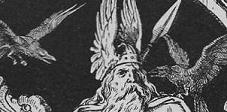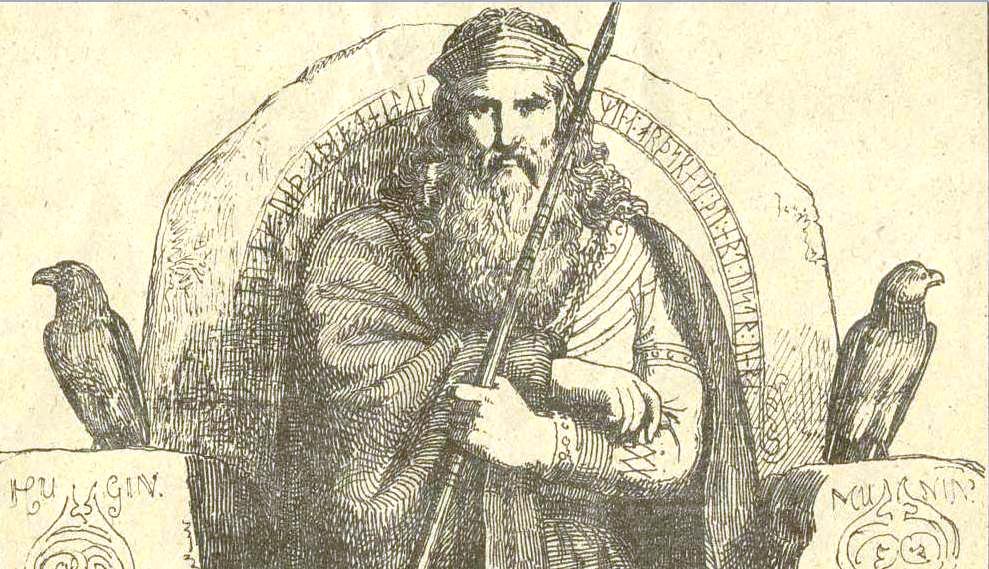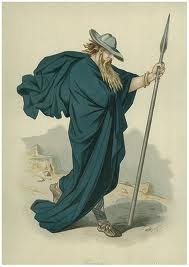The Poetic Edda: A Study Guide
The Speech of the Masked One

[PREVIOUS][MAIN][NEXT]
[HOME]
MS No. 2365 4to [R]
AM 748 I 4to [A]
Normalized Text:
Saðr ok Svipall
ok Sanngetall,
Herteitr ok Hnikarr,
Bileygr, Báleygr,
Bölverkr, Fjölnir,
Grímr ok Grímnir,
Glapsviðr ok Fjölsviðr;
Saðr ok Svipall
ok Sanngetall,
Herteitr ok Hnikarr,
Bileygr, Báleygr,
Bölverkr, Fjölnir,
Grímr ok Grímnir,
Glapsviðr ok Fjölsviðr;
ok Sanngetall,
Herteitr ok Hnikarr,
Bileygr, Báleygr,
Bölverkr, Fjölnir,
Grímr ok Grímnir,
Glapsviðr ok Fjölsviðr;
in Icelandic Poetry
“The Song of Grimnir”
in Edda Sæmundar Hinns Frôða
“The Lay of Grimnir”
Mortals who to my fanes convene
Shall hail me with a thousand names,[1]
|
[1]
"Shall hail &c."
--- The names of Odin are the following: Grimer, Gangler,
Herian, Hialmber, Theccer, Thrid, Thud, Uder, Helblind, Harr,
Sader,
Snipal, Sann-getal, Herteiter, Hnicarr, Bileyger, Bal-eyger,
Baulvercer, Fiolner, Grimar, Grimner, Glapsuid, Fiolsuid,
Sithaviter, Sidsceggar, Sigfander, Henikuder, Alfander,
Valfander, Atrid, Farmat, Jale, Rialer, Vider, Osci, Omi,
Jafnhar, Biflinder, Gondler, Harbard, Suidur, Suidner, Ygger,
Thunder, Vacer, Hropter, Gauten, Jalcer, Ofner, Suafner.
|
47. Sad and Svipall, and Sanngetall, Herteit and Hnikar Bileyg, Baleyg, Bölverk, Fjölnir, Grim and Grimnir, Glapsvid and Fjölsvid,
Dits de Grimnir
"Grimnir's Poem"
in Edda Saemundar
“The Sayings of Grimnir”
Joyeux-de-troupe, et Grand-Hennisseur,
Œil-instantané, Œil-de-bûcher, Malfaisant et Très-Versé, Déguisé, et Versé-en-tromperies;
True (Saðr), and Fickle (Svipall), and Just-Guessing (Sanngetall), Joy-of-the-Troop (Herteitr), and Grand-Neigher (Hnikarr),
Instantaneous-eye (Bileygr), Eye-of- fire (Bâleygr), Harmful (Bölverkr) and Well-versed (Fiölnir), Disguised (Glapsviðr), and Versed-in-Deception (Fiölsviðr);
and Fickle,
On-driver, Eager in War,
Flashing-eyed, Flaming-eyed,
Bale-worker, Shape-shifter,
Veiled One, Masked One,
Wile-wise and Much-wise,
in The Poetic Edda
“Grimnismol: The Ballad of Grimnir”
in The Poetic Edda
“The Lay of Grimnir”
and Sanngetal,
Herteit and Hnikar,
Bileyg, Baleyg,
Bolverk, Fjolnir,
Grim and Grimnir,
Glapsvith, Fjolsvith.
and Sanngetal(77),
Herteit(78) and Hnikar(79),
Bileyg(80), Baleyg (81),
Bolverk,(82) Fjolnir,(83)
Grim and Grimnir,
Glapsvith, Fjolsvith,
75. "The Truthful."
76. "The Changeable."
77. "Truthfinder."
78. "Glad in Battle."
79. "[Spear-] Thruster."
80. "One-Eyed."
81. "Fiery-Eyed."
82. "Bale-Worker."
83. "The Concealer."
in The Elder Edda
“The Lay of Grimnir”
in The Poetic Edda
“Grimnir’s Sayings”
and Truth-Getter,
Battle-Glad, Abaser,
Death-Worker, Hider,
One-Eye, Fire-Eye,
Lore-Master, Masked,
Deceitful.
and Sanngetal,
War-merry and Hnikar,
Weak-eyed, Flame-eyed,
Bolverk, Fiolnir,
Mask and Masked One,
Maddener and Much-wise;
in The Poetic Edda, Vol. III: Mythological Poems
“The Lay of Grimnir”
The Elder Edda: A Book of Viking Lore
'The Lay of Grimnir"
and Sure Guesser,
War Happy and Hoaxer,
Failing Eye, Fiery Eye,
trouble Worker, Hider,
Mask and Masked,
Great Seducer and Great Sage,
and Truth-getter,
Host-glad, Inciter,
Feeble-eye, Blaze-eye,
Bale-worker, Hider,
Battle-mask and Masked One,
Seducer and Much-wise,
in The Poetic Edda
“Grimnir’s Sayings”
in The Poetic Edda
“The Words of Odin in Disguise"
and Sanngetal,
War-merry and Hnikar,
Weak-eyed, Flame-eyed,
Bolverk, Fiolnir,
Mask and Masked One,
Glapsvid and Much-wise;
and True Father,
Battle-Merry, Battle-Stirrer,
Curse-Eye and Fire-Eye,
Evildoer, Spellcaster,
Masked and Shadowed-Face,
Fool and Wiseman.
[HOME][GRÍMNISMÁL]
In 1985, Einar Haugen in "The Edda as Ritual "corrects" the Auden/Taylor translation, where he thinks they "missed the meaning."
Auden/ Taylor Translation 1967 |
Einar Haugen Translation 1983 |
|
46. Truthful, Changeable,
Truth-Getter, Battle-happy, Overthrower, Death-Worker, Many-Shaped, One-Eyed, Fire-Eyed, Lore-Master, Masked, and Deceitful. |
Haugen remarks: The contradictions and ambiguities are only too apparent; How can Odin be both "truthful" and "deceitful"? The list of names in this poem alone runs to about 50, and someone has counted up 125 in all. Odin says himself: Grm. 48/5-7 By a single name I was never known |
|

Hétumk...
In the poem Fjölsvinnsmál (the Speech of Fjölsviðr), Odin introduces himself as the gatekeeper of the castle and engages the hero Svipdag (Swift-day) in a series of questions concerning his adventures before arriving at the gate in search of the beautiful Menglad, kept safely within the castle walls. Only the one who brings a feared sword from the underworld, powerful enough to kill the golden rooster on Mimir's Tree can enter the castle. In the course of conversation, it becomes clear that Svipdag is destined to be her husband. Thus, he must have brought the sword as a bride-price for her. Odin, disguised as Fjölsviðr, tests him before allowing him to enter. We later find the same weapon in the hands of Freyr's servant Skirnir ("Shining" cp. Svipdag), sent as a bride-price for the giantess Gerd. Lokasenna 42 tells us that Freyr exchanged his sword for Gerd and will sorely regret that baragian when Ragnarok arrives. Then Surt himself will wield the terrible weapon designated as "sol val-tiva", the "sun of the god(s) of the slain" and "the bane of branches" (a kenning for fire) by the Völuspá poet. Surt uses the sword to set the entire world alight. Flames play against heaven itself. The earth is burnt and sinks into the sea.
Near the end of the poem Fjölsvinsmál, the beautiful "giantess" Menglad, who is clearly characterized as a goddess, coyly says that if Fjölsviðr (Odin) is lying to her regarding her lover Svipdag's return, then may "wise ravens pluck out your eyes as you hang on the gallows". Odin of course is the one-eyed, god of ravens and of the gallows. His ravens, Thought and Memory by name, can especially be considered wise. The poet is clearly revealing the characters he intends from behind his poetic veil. Svipdagsmal is a riddle poem, where few things are called by their proper names. Menglad "the necklace lover" has long been recognized as the goddess Freyja, owner of Brisinga-men, "the fire-necklace". Powerful and lovely maidens including Eir, the goddess of healing sit at her feet. Men build altars to her, and any woman who seeks her is cured of disease no matter how long she has suffered. The poem Fjölsvinsmál (The Speech of Fjolsviðr) appears to preserve the myth of the arrival of Freyja's husband, "the man called Óðr," to Asgard. Odin greets him at the gate.
THE LAYS OF SVIPDAG
The Texts of Grougaldur and Fjolsvinnsmál
NEXT: ODIN RECITES HIS NAMES
[PREVIOUS][MAIN][NEXT]
[HOME]
